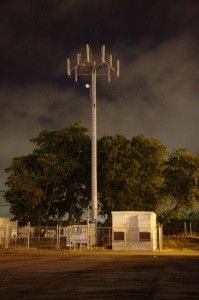Posted
16 Dec 2013 in Case Notes
When T-Mobile sought to place a cell tower in a park owned by the City of Huntington Beach, California, the City granted the company all the regulatory approvals it required. But the City also informed T-Mobile that before it would finally lease the company the rights to the City property that it needed, the company must first obtain approval from City voters, under an amendment to the City charter known as Measure C.

T-Mobile refused. It claimed that
Section 332(c)(7) of the Communications Act, 47 U.S.C. § 332(c)(7), preempts this City requirement.
Is T-Mobile correct?
Not according to the Ninth Circuit, which decided
Omnipoint Communications, Inc. v. City of Huntington Beach, No. 10-56877 (9th Cir. Dec. 11, 2013) last week. The court ruled that because Section 332(c)(7) "applies only to local zoning and land use decisions and does not address a municipality's property rights as a landowner," it does not preempt this local requirement, which concerns only how the City may lease its property.
Enacted in 1990, Measure C states:
 Third Circuit
Third Circuit






